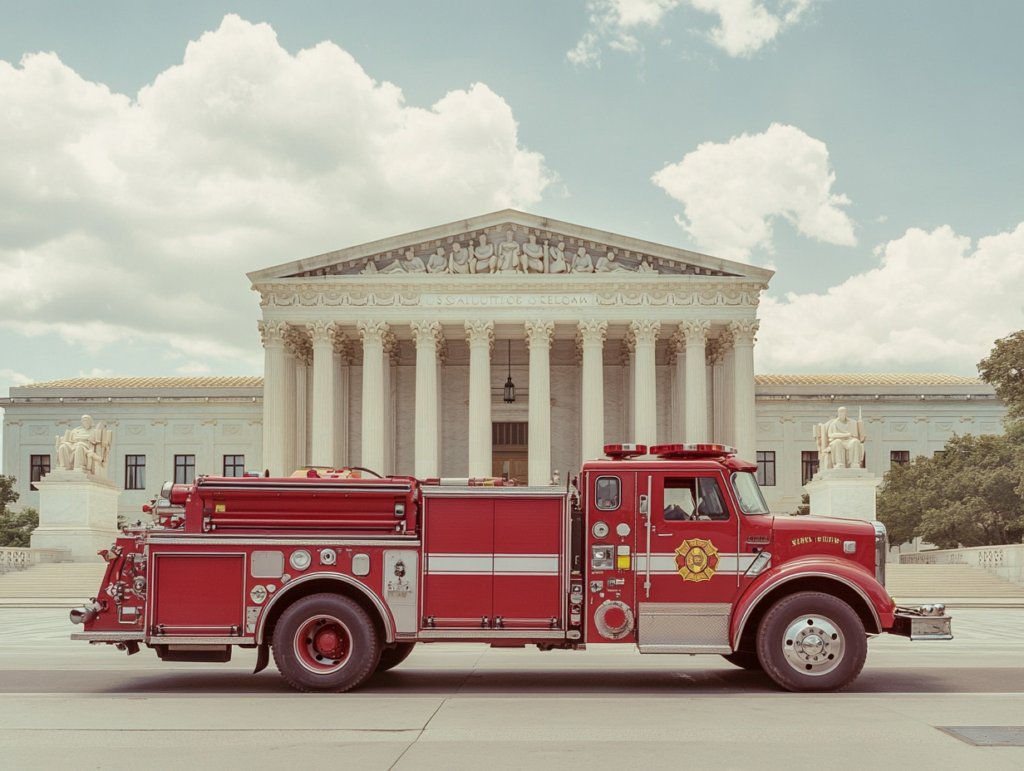[dc]A[/dc]ttorneys for Ronald Hittle, former fire chief of Stockton, California, have asked the U.S. Supreme Court to hear his case, arguing that he was unfairly fired for attending a Christian leadership event. Stockton city officials maintain that his firing was due to policy violations and poor judgment when the city faced significant financial strain. Hittle’s lawyers, however, believe his religious beliefs were a central factor in the decision. This legal battle can potentially impact how religious expression is handled in public workplaces nationwide.
The City of Stockton’s Argument
The City of Stockton asserts that Hittle’s firing was based on clear violations of city policies, not on religious bias. In 2011, as Stockton faced the threat of bankruptcy, city leaders worked to cut costs across departments, including the fire department, which Hittle led. According to Stockton’s city officials, Hittle resisted these cost-cutting measures, and his handling of departmental budgets clashed with the city’s needs during the financial crisis.
One major point of contention was Hittle’s attendance a Livermore, California conference of the Global Leadership Summit, an organization affiliated with the Willow Creek Community Church in Illinois. The event has featured speakers, including prominent people such as former U.S. Presidents and business leaders, aiming to train Christian leaders to bring their faith into leadership. Stockton claims that Hittle attended the event on city time and in a city vehicle, bringing several colleagues along without prior approval. Stockton argued that the Summit’s religious mission made it inappropriate for public employees to attend on the city’s payroll. According to case documents, Hittle and the other city employees attended the conference at their own expense.
Stockton also cited other concerns in Hittle’s termination, which took effect on October 3, 2011. An independent report found that Hittle had undisclosed financial ties with firefighter union members, including co-owning a vacation cabin with the union president, which the city saw as a potential conflict of interest. Additionally, Hittle’s supervisors felt that his leadership was out of alignment with city policy goals.
Hittle’s Argument
Hittle argues that his faith was the primary reason for his firing. He describes repeated instances where city officials questioned his religious beliefs, including discussions about his role in a so-called “Christian coalition” within the department. When he disclosed his Christian faith to Stockton’s city manager, Hittle says he felt uncomfortable and rejected. He claims these reactions show an underlying bias against his faith.
According to Hittle’s legal team, the Global Leadership Summit was not solely a religious event but a valuable training opportunity. His attorneys argue that Hittle attended it to strengthen his leadership skills, describing it as “the best leadership training” he had ever experienced. Hittle’s team, which includes First Liberty Institute, a religious rights organization, believes that public employees should be free to attend faith-based events without fearing termination. They also claim that the current legal standards under Title VII are overly restrictive for religious employees, and they hope the Supreme Court will clarify protections against faith-based workplace discrimination.
The Ninth Circuit’s Decision and the Case’s Future at the Supreme Court
Last year, the U.S. Court of Appeals for the Ninth Circuit ruled in favor of Stockton, finding that the city’s decision was based on “policy, not religion.” The court stated that Hittle’s termination followed a series of policy violations, not religious discrimination. Now, Hittle’s attorneys are asking the Supreme Court to intervene, arguing that current interpretations of Title VII discriminate against religious employees by allowing employers to cite policy reasons to mask religious bias.
First Liberty Institute, representing Hittle, states that the case could affect how religious protections are interpreted in the workplace. According to First Liberty, “In today’s cancel culture, many Americans are being forced to choose between their faith and their livelihood. Our nation’s laws protect people of faith so they should not have to face that choice. A win for Chief Hittle would be a win for millions of Americans.”
How Can First Liberty Claim Religious Discrimination if Hittle Attended for Secular Training?
First Liberty’s argument centers on the idea that, while Hittle attended the Global Leadership Summit for secular leadership training, Stockton’s response was influenced by bias against the event’s Christian associations. First Liberty argues that Stockton viewed the Summit through a lens of religious suspicion because it was hosted by a church and framed with Christian language, and that this religious aspect was unfairly highlighted as grounds for termination.
In essence, First Liberty suggests that even if Hittle attended with purely professional, secular intent, Stockton’s decision-makers saw his actions as problematic because they perceived the Summit as religious. They argue that this perception reflects an anti-religious bias, suggesting that Hittle’s supervisors might have accepted secular training from another source but acted differently because this event had Christian roots. First Liberty frames the case as one where Stockton unfairly penalized Hittle not for professional misconduct, but for associating with a faith-related event, turning what should have been a secular professional experience into grounds for religious discrimination.
In doing so, First Liberty aims to show that Hittle’s attendance at a Christian-sponsored event became a proxy for discrimination against his faith, reinforcing their stance that federal law protects employees from punishment related to religious affiliation or perceived religious involvement, even if the employee’s purpose is secular.
Case: Ronald Hittle v. City of Stockton – Supreme Court Docket 24-247
